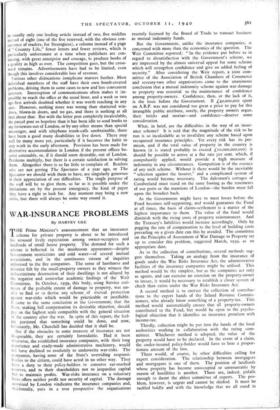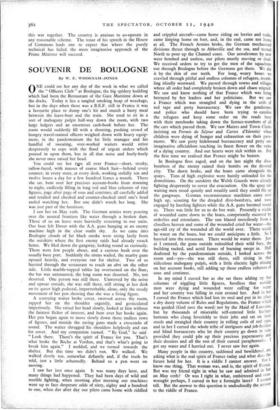WAR-INSURANCE PROBLEMS
By HARVEY GEE
T HE Prime Minister's announcement that an insurance I scheme for private property is about to be introduced has aroused lively expectation among owner-occupiers and landlords of small house property. The demand for such a scheme is reflected in the mushroom appearance—despite Government restrictions and cold water—of several mutual associations, and in the continuous stream of inquiries addressed to the fire companies. The sense of harshness and injustice felt by the small-property owners as they witness the indiscriminate destruction of their dwellings is not allayed by the negative and somewhat academic findings of the Weir Committee. In October, 1939, this body, using Service esti- mates of the probable extent of damage to property, was un- able to find or to devise any scheme. of mutual protection against war-risks which would be practicable or justifiable. It came to the same conclusion as the Government, that the State, making full compensation its desirable objective, should pay on the highest scale compatible with the general situation of the country after the war. In spite of this report, the feel- ing persisted that something could be done, and now, fortunately, Mr. Churchill has decided that it shall be.
But if the obstacles to some measure of insurance are not insuperable, they are certainly formidable. Had it been otherwise, the established insurance companies, with their long experience and ready-made administrative machinery, would not have declined so resolutely to underwrite war-risks. The Companies, having none of the State's overriding responsi- bilities to the citizen, could have acted in no other way. They have a duty to their policy-holders to conserve ear-marked reserves, and to their shareholders not to jeopardise capital but to . maintain profits. War-risks insurance on a voluntary lnsis offers neither profit nor security of capital. The damage sustained by London vindicates the insurance companies and, incidentally, puts in a true perspective the organisations recently licensed by the Board of Trade to transact business as mutual indemnity funds.
But the Government, unlike the insurance companies, is concerned with more than the economics of the question. The Weir Committee reported: " In the evidence put before us in regard to dissatisfaction with the Government's scheme, we are impressed by the almost universal appeal for some scheme which will strengthen confidence and give an added feeling of security." After considering the Weir report, a joint com- mittee of the Association of British Chambers of Commerce and seventy-two other organisations came to the unanimous conclusion that a mutual indemnity scheme against war-damage to property was essential to the maintenance of confidence among property-owners. Confidence, then, or the lack of it, is the issue before the Government. If £4o,000,000 spent on A.R.P. was not considered too great a price to pay for this intangible public attribute, surely, the property owners argue, their bricks and mortar—and confidence—deserve some consideration.
What, in brief, are the difficulties in the way of an insur- ance scheme? It is said that the magnitude of the risk to be run is so incalculable as to invalidate any scheme based upon recognised insurance principles. Yet every risk has its pre- mium, and if the total value of property in the country is known (it is stated probably to exceed E to,000,000,000) it should be possible to arrive at a flat rate per cent. which, if compulsorily applied, would provide a high measure of indemnity in any circumstances. Gompulsion is of the essence of any such scheme. Without it there would be the inevitable " selection against the insurer," and a complicated system of rating would become necessary. The dalesmen's cottages of Cumberland must stand on the same footing as the tenements of our ports or the mansions of London—the burden must fall upon the broadest back.
As the Government might have to meet losses before the Fund becomes self-supporting, and would guarantee the Fund at all times, the basis of claims-settlement is a matter of the highest importance to them. The value of the fund would diminish with the rising costs of property reinstatement. And the Treasury's liabilities would increase accordingly. Only by pegging the rate of compensation to the level of building costs prevailing on a given date can this be avoided. The committee on the Principles of Assessment of War Damage to Property set up to consider this problem, suggested March, 1939, as an appropriate date.
As to the collection of contributions, several methods sug- gest themselves. Taking an analogy from the insurance of goods under the War Risks Insurance Act, the administrative facilities of the insurance companies might be utilised. This method would be the simplest, but as the companies act only as agents, and can exercise no coercion on the property-owner to insure, it would be necessary to establish a closer system of check than exists under the War Risks Insurance Act.
A second method is to entrust the collection of contribu- tions to the expert hands of the Inland Revenue Commis- sioners, who already know something of a property-tax. This method would automatically ensure that all property-owners contributed to the Fund, but would be open to the psycho- logical objection that it identifies an insurance premium with income-tax.
Thirdly, collection might be put into the hands of the local authorities working in collaboration with the rating com- mittees. Whichever method is adopted, the value of the property would have to be declared. In the event of a claim, the under-insured policy-holder would have to bear a propor- tionate amount of the loss.
There would, of course, be other difficulties calling for expert consideration. The relationship between mortgagors and mortgagees is one of them. The position of landlords whose property has become unoccupied or untenantable by reason of hostilities is another. There are, indeed, pitfalls enough to daunt the ablest committee of experts. The pro- blem, however, is urgent and cannot be shirked. It must be tackled boldly and with the knowledge that we all stand in this war together. The country is anxious to co-operate in any reasonable scheme. The tenor of his speech in the House of Commons leads one to expect that where the purely technical has failed, the more imaginative approach of the Prime Minister will succeed.



























 Previous page
Previous page